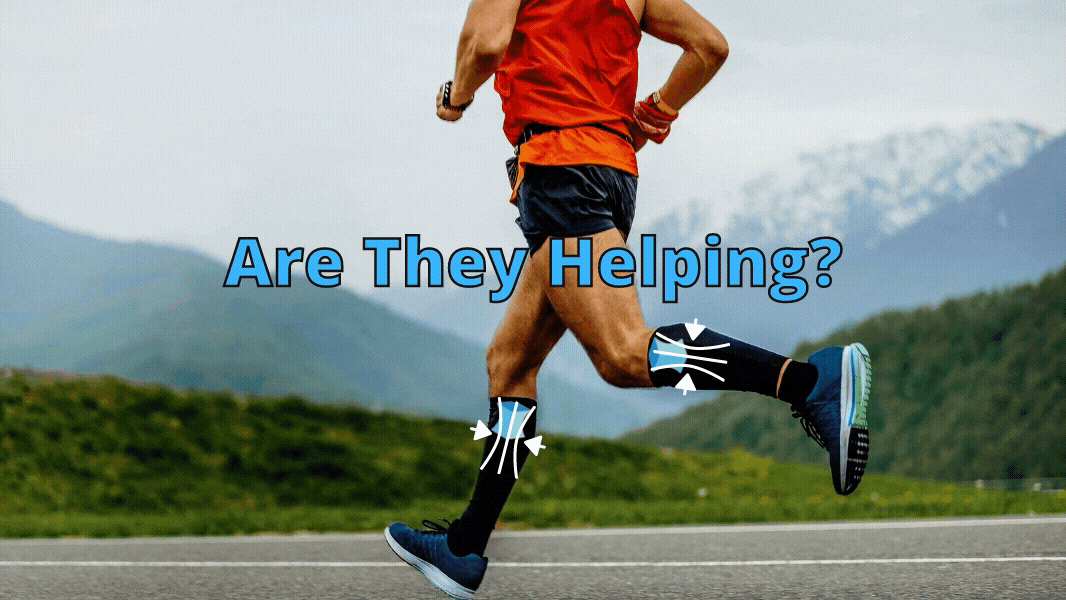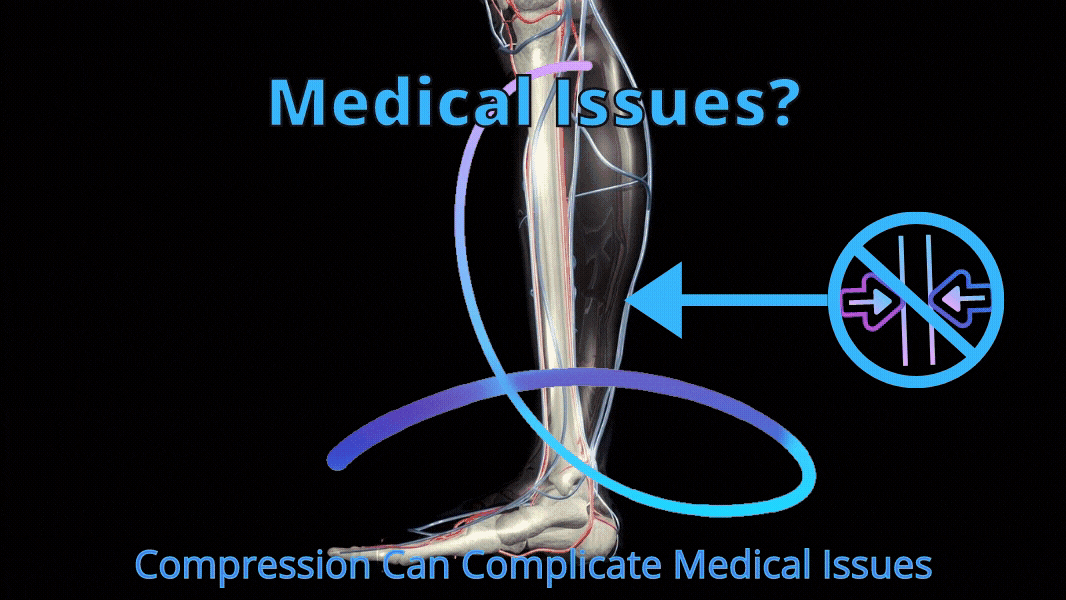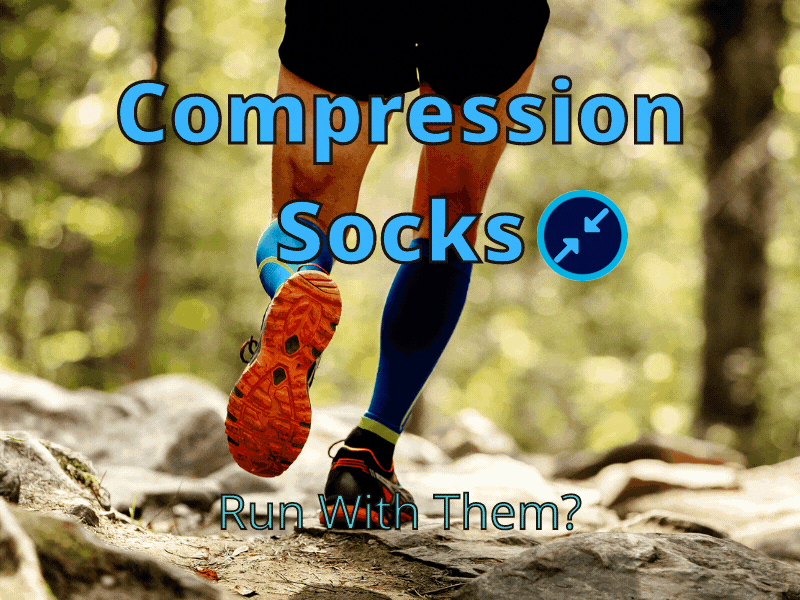Compression socks for runners are elastic socks that are designed to be worn up to the knee. These strong socks squeeze around your calf, compressing the veins along with your leg muscles.
Compression socks are helpful when running because they reduce swelling, tiredness, and cramps during long runs. Researchers haven’t found many positive effects on running with these socks, but runners say they do, including keeping your legs warm in cold weather and providing an extra layer of protection from injuries.
However, you should not wear compression socks while running if you have certain health issues such as skin infections, peripheral neuropathy, and peripheral artery.
These socks may relieve cramps and fatigue and ultimately allow you to run faster for longer. If you are a runner and suffering from tired legs, cramps, and calf pains, you may want to find out how these socks can help you.
10 Ways Compression Socks Help Runners

As compression socks are getting popular, many runners now swear by them. In this article, I am going to explain to you how compression socks can help you in running. Here’s a list of both scientifically proven and educated ideas for why compression socks are helpful.
- Enhance oxygen delivery: While running the most important aspect of your performance is that enough amount of blood-rich oxygen is flowing to your muscles. If you are a 5k or 10k runner, you must know the worst thing that could happen to you is losing your calf muscle strength before the finish line.
- So compression socks are here for the save. If you wear high-quality compression socks, they may ensure that optimal oxygen is delivered to your legs throughout the race. Quality compression socks are looser on the top and tighter at the bottom so that it provide compression gradually to further ensure proper circulation.
- Help to fight the impact of gravity: Compression socks help your legs reduce the impact of gravity by creating pressure to push fluid up your legs. An increase in the blood flow helps to supply essential nutrients and oxygen to your legs when they need them the most.
- Leg protection: Of course, wearing compression socks on the lower legs is better than wearing nothing. These socks will protect your legs from abrasions, scratches, dirt, and poison ivy on the trails.
- Warmth: If you are someone who loves to wear shorts while running, shorts are an excellent option for you when the weather is hot. But what would you do when it’s cold and you don’t like wearing tights? Again! Compression socks are on hand for your rescue. These socks help your leg muscles stay warm even in the coldest months and prevent you from muscle strain.
- Reduce swelling and cramps: Excessive movement is one of the common reasons for calf muscle fatigue. If you wear compression socks, the pressure from these socks reduces this movement and the effort required of your legs, hence reducing fatigue and keeping you energized.
- Decrease lactic acid: Whenever you run, walk, or exercise, your body produces lactic acid. Lactic acid is a waste product, so if you let it stay in your muscles, it makes you extremely sore the next morning you wake up. Wearing compression socks while running or exercising can help you to reduce or avoid this soreness.
- Enhance blood flow: Wearing compression socks while running will narrow your veins which in return increases blood flow. It allows the blood to reach your heart quickly and thus removes the lactic acid.
- Recovery: From what I have learned, wearing compression socks and sleeves may improve recovery from muscle soreness after a long run.
- Performance: If you wear compression socks while running, it may benefit your positive mental attitude and lead to improved performance. I think the graduated compression helps with blood circulation and lactate removal, which might be the reason for improved performance.
- Injury: Wearing compression socks can be beneficial for your lower leg injuries, such as calf strains, shin splints, and Achilles tendonitis. It also helps you to speed up your recovery.
Ankle-High Length Compression Socks
Compression socks now come in Ankle-High Lengths as well. These socks are fabricated to apply pressure around the ankles to enhance blood circulation, which will bring you many health benefits.
Always go for good compression socks that are made from high-quality synthetic fabrics because these fabrics hug your ankle firmly but gently. These socks will cover your entire foot below your ankle.
When you apply the socks, the pressure from the fabric pushes oxygen-rich blood from your foot to your heart; this improves the blood flow and hence reduces swelling in your feet.
Compression ankle socks are exclusively designed with athletes in mind, so make sure to consult your doctor before wearing your pair.
When to Wear a Full Compression Sock
In this section, I am going to describe a few situations where compression socks may prove to be beneficial and also who can be the perfect candidates for these socks.
If you are someone who is dealing with leg pain due to your veins and or is suffering from swelling, compression may provide some relief to you.
Compression socks may benefit Individuals with arterial and lymphatic issues for example, intense vein clotting, varicose veins, swelling, and venous leg sores. Various degrees of compression, from gentle to extreme, may be utilized to treat particular venous disorders.
Another group that can get help from compression socks is pregnant women because of intense vein thrombosis and the risk of blood clusters. Due to the hormonal changes in the bodies of pregnant women, more blood volume is needed.
Furthermore, swelling and pain, especially in the legs during pregnancy, is normal. Maternity compression stocks may provide some reprieve and ease from these symptoms during pregnancy.
Diabetic patients are often suggested to use compression socks to release the swelling in legs and ankles, the most common issue with diabetes. Generally, doctors prescribe compression socks for sugar-related venous hardening.
However, it is important to consult your doctor before you use any compressed stockings, as every diabetic person is not compatible with compression therapy.
If you keep your body in the same position most of the time, it may stress your muscles and tissues and the bloodstream starts to slow. This is the reason behind the aching or exhaustion that you feel in your limbs, feet, and ankles after continued time on your feet or long periods of sitting.
By putting on compression socks, it may improve blood flow to ease pain and swelling in such situations. You might need to put on your compression hoses or similar garments the entire day and then remove them before heading to sleep.
When to Wear a Calf Sleeve While Running
Calf compression sleeves may help you to treat issues such as tiredness, stiffness, and distress in your legs during or post-exercise.
You can wear calf compression sleeves while running to boost performance, minimize soreness, and allow muscles to straighten out after the run. They give an additional coating of warmth to the legs, assist with keeping muscles warm, and the blood circulating.
They also accelerate the process of recovery after your workout by supporting blood circulation to the lower body. They can improve blood flow through muscles, which may help with higher oxygen levels, as well as the delivery of important nutrients to your muscles, hence they assist in quicker recuperation one study found. (roadrunnersports.com)
Research has proved that swelling may be reduced by compression calf sleeves especially if you’re stationary all day. The compression technology reduces swelling by promoting blood flow in your body when it is required. It is important for runners because swelling is an issue for those who run for long distances and older adults.
Compression may assist with easing the slight pains caused by running, for example, when using shin braces, holding the sinew firm, and reducing spasms. Compression calf sleeves don’t address the problem that leads to the pain; they enable you to do exercise without dealing with inconveniences.
They also help to protect your legs from getting any types of germs and bumps, also shielding you from having scratches and nicks while running on tough terrain. Wearing calf compression socks will prevent your legs from getting dirty which may save your time to clean them after exercise.
Another benefit of compression sleeves is that they are mostly moisture-wicking making them user-friendly in summer. Performance mainly depends on comfort and temperature plays a major role in running.
When Not To Wear a Compression Sock

Donning compression stockings is not suitable in some conditions and it is recommended to consult your doctor before using compression hosiery or therapy. Let me explain which occasions you may need to avoid using compression socks:
- If you’re suffering from impaired arterial flow, using compression sleeve or any type of compression on the body can create major complexities regarding ischemia (a poorly oxygenated bloodstream). This fact has been proved by an article published in the Canadian Medical Journal in 2014.
- In case you’re suffering from the complexities emerging from diabetes or congestive cardiovascular breakdown. Even though compression may provide some ease to the swelling originated by these ceaseless conditions, it may cause problems in the same cases. It is recommended to consult the doctor before using compression.
- Compression must be avoided, if you are experiencing issues regarding sensitive skin and other conditions which may influence skin sensation, skin infection, and thin skin. For instance, peripheral neuropathy may lead to harm to the nerves in extremities.
Conclusion
Compression socks are quite helpful to increase your blood flow and may provide you some extremely good benefits during your daily runs. But keep in mind that these stocks aren’t a cure for all your running pains and aches. Though these socks may prove beneficial during your run; they are not designed to cure your injury.
Having said that, you definitely may want to keep a pair of compression socks in your bag to help you go through the last miles of your run, and recover afterward, and prevent swelling.
Compression socks may prove to be a great addition to your running gear, but keeping your body happy and healthy is also essential. Most importantly choose the right pair of running shoes and seek medical help when needed.
Thanks for visiting Helpshoe.com
References
- https://comprogear.com
- https://www.midliferunning.com
- https://comprogear.com
- https://coachdebbieruns.com/compression-socks/
- https://www.ameswalker.com
- https://www.roadrunnersports.com
- https://www.ameswalker.com
- https://www.nhs.uk/
- https://www.healthline.com
- https://bdrivensports.com/
- https://www.fortunatefeet.com




